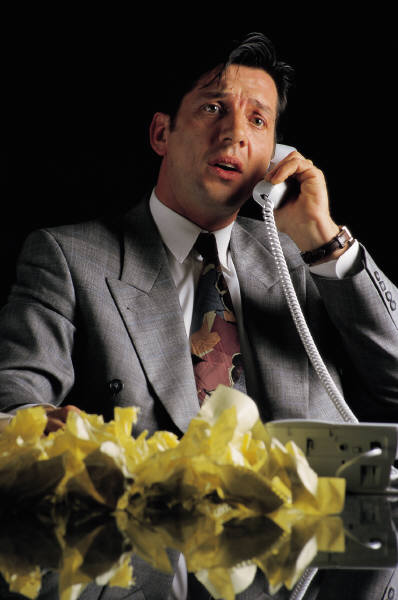 La perseverancia nos permite lograr nuestros deseos y aumentar nuestra confianza. En otras ediciones del Lunar Letter hemos hablado y hecho referencia sobre la fórmula:
La perseverancia nos permite lograr nuestros deseos y aumentar nuestra confianza. En otras ediciones del Lunar Letter hemos hablado y hecho referencia sobre la fórmula:
C = EPPA²
El éxito se logra por medio de la confianza y ésta se obtiene a través de la Experiencia, la Preparación, la Perseverancia y la una Actitud positiva. Hoy hablaremos sobre la perseverancia.
 Muchos conocemos el cuento del Bambú Chino. La semilla del bambú se siembra, se riega y se cuida por un año y no aparece nada. No hay señal de vida. Se riega y se cuida otro año y todavía no se ve el resultado. De esta manera van pasando los años. En algún momento alrededor del quinto año se brota las primeras hojas del Bambú Chino y luego crece 30 metros en seis semanas.
Muchos conocemos el cuento del Bambú Chino. La semilla del bambú se siembra, se riega y se cuida por un año y no aparece nada. No hay señal de vida. Se riega y se cuida otro año y todavía no se ve el resultado. De esta manera van pasando los años. En algún momento alrededor del quinto año se brota las primeras hojas del Bambú Chino y luego crece 30 metros en seis semanas.
Sabemos que el Bambú Chino se prepara para un crecimiento impresionante. Durante los cinco años que no se ve nada, un sistema de raíces se está formando para sostener el crecimiento extraordinario del bambú.
Nuestro éxito y confianza nos llega a través de las semillas que sembramos en nuestra mente. Regamos las semillas del éxito y confianza con nuestras acciones y hábitos de cada día. Cómo el Bambú Chino, si dejamos de regar nuestras semillas éstas se morirían antes de ver los resultados.
El secreto que muchos anhelamos es la manera de ser perseverantes cuando estamos a punto de “tirar la toalla” y darnos por vencidos. No hay respuesta fácil ni fórmula mágica. Lo que si podemos hacer es concentrarnos en los resultados de cada paso que tomamos y ser atrevidos en las acciones que emprendemos para lograr nuestro objetivo. En los momentos cuando más lo necesitamos podemos guiarnos por las palabras de los sabios:
Toda tarea noble al principio es imposible.
– Thomas Carlyle
No es que sea tan inteligente; es que me mantengo por más tiempo en los problemas.
– Albert Einstein
No cuenta el que critica. No es el hombre que señala como el hombre fuerte se tropezó o como el que está haciendo algo pudo haberlo hecho mejor. El mérito pertenece al que está en la cancha; cuya cara está manchada con polvo, sudor y sangre; quien se esfuerza con valentía y llega corto una y otra vez, porque no hay esfuerzo sin error y defecto; quien realmente hace lo que tiene que ser hecho, quien conoce grandes entusiasmos, las grandes devociones, y quien se esfuerza en algo digno; quien en el mejor de los casos, al final, conoce el triunfo de haber hecho algo importante; y quien en el peor, si fracasa, por lo menos fracasa ateviéndose en grande, para que su lugar jamás sea con aquellas almas frías y tímidas quienes conocen ni la victoria, ni la derrota.
– Theodore Roosevelt
Siguiendo estos pasos podemos asegurar dar nuestro mejor esfuerzo sin necesidad de volver la vista atrás pensando en algo que pudiera haber sido.
∞ Rob McBride ∞
LL I 4


 I was awaiting a call to set an appointment for an important meeting. The call came through and the person asked if I had time to talk right then. I was anxious to talk to the person, so I said, “Sure!” The truth of the matter was that I was in the middle of another project and getting ready to leave for another appointment.
I was awaiting a call to set an appointment for an important meeting. The call came through and the person asked if I had time to talk right then. I was anxious to talk to the person, so I said, “Sure!” The truth of the matter was that I was in the middle of another project and getting ready to leave for another appointment. I said, “Hang on just a minute.” I rushed downstairs, found a pen, paper and some notes I had written. I then ran back upstairs to the phone. When I got back on the line, I was out of breath. Perhaps 38 seconds had passed. Not an incredibly long time on a clock but an eternity when you are waiting for someone on the phone.
I said, “Hang on just a minute.” I rushed downstairs, found a pen, paper and some notes I had written. I then ran back upstairs to the phone. When I got back on the line, I was out of breath. Perhaps 38 seconds had passed. Not an incredibly long time on a clock but an eternity when you are waiting for someone on the phone.
 One week later on the follow up call, I received a polite e mail saying, “I spoke to our training people in New York. They want to review other programs in addition to yours so let’s put it on hold for a few weeks.” The final blow hit its mark relentlessly.
One week later on the follow up call, I received a polite e mail saying, “I spoke to our training people in New York. They want to review other programs in addition to yours so let’s put it on hold for a few weeks.” The final blow hit its mark relentlessly. ¿Cuál es el valor de la experiencia?
¿Cuál es el valor de la experiencia? Edison le contestó que había aprendido 2.000 mil maneras diferentes de No hacer un bombillo que funcionara. La experiencia en si es importante pero mucho más importante es lo que aprendemos de todo lo que enfrentamos mientras obtenemos experiencia.
Edison le contestó que había aprendido 2.000 mil maneras diferentes de No hacer un bombillo que funcionara. La experiencia en si es importante pero mucho más importante es lo que aprendemos de todo lo que enfrentamos mientras obtenemos experiencia. En otros casos hacemos avances a pesar de las posibles consecuencias y/o falta de experiencia. De esta manera, vamos obteniendo más confianza y experiencia a través de los intentos. Eso sí, para obtener la experiencia tenemos que arriesgarnos a fracasar. Vemos los resultados de todos los éxitos en este juego de amor. ¡Han provocado un incremento vertiginoso en la natalidad y la población del planeta tierra!
En otros casos hacemos avances a pesar de las posibles consecuencias y/o falta de experiencia. De esta manera, vamos obteniendo más confianza y experiencia a través de los intentos. Eso sí, para obtener la experiencia tenemos que arriesgarnos a fracasar. Vemos los resultados de todos los éxitos en este juego de amor. ¡Han provocado un incremento vertiginoso en la natalidad y la población del planeta tierra! ¿Cómo lo logramos?
¿Cómo lo logramos? C = EPPA²
C = EPPA²